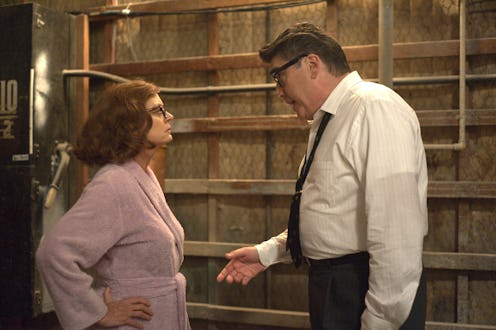
Behind the glitz of the Golden Age of Hollywood was some major dysfunction. While any film buff worth his or her salt knows that what was portrayed in the movies of the '30s, '40s, '50s, and early '60s was a far cry from what happened behind the scenes, Feud is highlighting the juxtaposition of what old Hollywood represented and how it really was. While Feud has plenty of that old school glam that so many of us lovers of the silver screen are still fascinated with, it also does not pretend that everything was so romantic backstage. Actually, Feud shines a harsh light on the true ugliness of Hollywood with all of the progressive sensibilities that come with a Ryan Murphy-helmed project. And it's an absolute dream for socially conscious lovers of classic Hollywood.
Although sexism is still a major problem in Hollywood today, many 21st century actresses have been outspoken about it. Even if that doesn't mean there are many working solutions to this institutionalized gender discrimination, the optimist in me can say at least sexism is now part of the public dialogue. Yet, as was seen in the first episode of Feud, sexism (and ageism, for that matter) was rampant in Hollywood in the early '60s with it seemingly going unchecked.
Hollywood is not really known for its morals, but during this golden age that Feud is showing the tail end of, the film industry followed the self-imposed Motion Picture Production Code — also known as the Hays Code. As NPR reported, this code from the 1930s to the 1960s ordered that no film should "lower the moral standards of those who see it." The rules included no lustful kissing, mocking religion, or drug use, among many others. While there were inherent problems within this code (it forbade interracial romances), it's fascinating to consider the contrast between the "wholesome" images these movies attempted to portray with what the people who made these films were doing in real life, especially since sexism is a question of morality for me.
Even if social mores at the time made it acceptable to be racist or sexist behind closed doors, Feud is holding these legends of Hollywood accountable and invites audience members to see that many studio execs, directors, and actors were not only the antithesis of what they showed on screen, but also were sometimes just not decent human beings in general.
While you have Warner Bros. to thank for bringing classic movies like Now, Voyager; Casablanca; Mildred Pierce; A Star Is Born; My Fair Lady; and (of course) What Ever Happened to Baby Jane? to the screen, Feud alleges that founding brother Jack Warner had some questionable attributes. Although Feud is a dramatization of real events, Stanley Tucci did a fair amount of research on the man he portrays in the FX show and claimed to Entertainment Weekly that "he was really not a nice person" and called him "duplicitous." That more than came across in Feud since even savvy fans of Murphy's were undoubtedly shocked to hear Tucci's character call Hollywood screen legend Bette Davis a c*nt in the dramatized scene.
Joan Crawford is another lesson in contradictions. As Jessica Lange portrays her, she was obsessed with preserving her image of the beautiful, hardworking woman that was showcased in so many of her movies. While Davis is more direct when it comes to her drinking habits and attitude, Crawford tries to hide the parts of her life from the public that don't reflect the persona she works so hard to maintain. For example, Lange's Crawford has her ever-handy flask to mask her frequent drinking and oozes charm with the press, her fans, and crews on her film. Yet, as Feud shows it, Crawford knows that her moves are calculated and those gifts for the camera crew were not out of the goodness of her heart. Feud's version shows her as manipulative and fixated on fame, youth, and success, which are not quite the defining attributes you want your favorite movie star to have.
Part of what makes Feud so delectable — besides the whole feud aspect between Crawford and Davis — is that the FX series is fully aware of the disparities between these Hollywood icons' public and and private personas. And while these disparities still exist with people in the entertainment industry today, nostalgia for the Golden Age of Hollywood can often make people turn a blind eye to these truths. Yet, Murphy shows with Feud: Bette and Joan that you can still have a massive amount of respect for the artistry and talent that came out of old Hollywood without accepting its completely backward sense of propriety and social norms. Instead, you should be acutely aware of Hollywood's long history of hypocrisy and demand that today's entertainment industry improve itself. After all, 50 years have passed since the events of Feud occurred and unfortunately, the issues the series are tackling are far from ancient history.